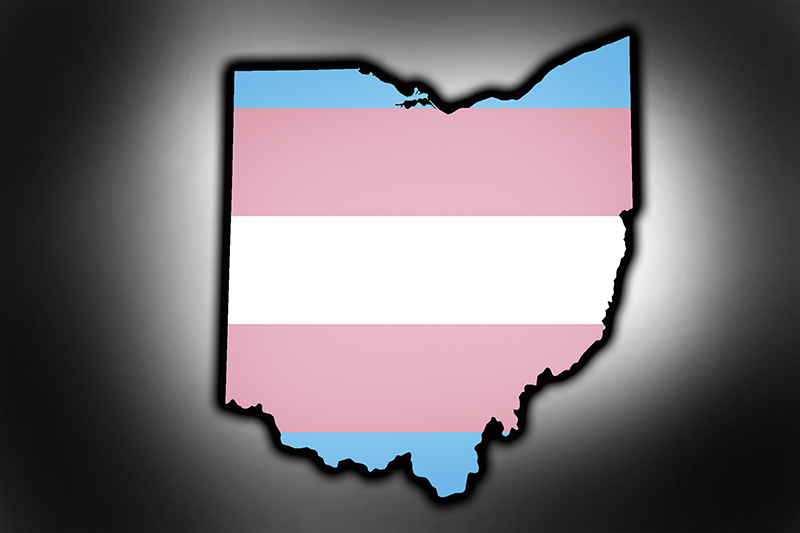Transgender Floridians Sue Over Medicaid Coverage Ban
A group of transgender people claim a rule barring Medicaid coverage for gender-affirming care is discriminatory and unconstitutional.

A group of transgender individuals is suing the state of Florida over a new rule prohibiting Medicaid from covering gender-affirming health care treatments, even if a patient’s primary medical provider declares that such care is medically necessary.
The plaintiffs in the lawsuit include August Dekker, a 28-year-old transgender man and Medicaid recipient who receives hormone therapy to treat his gender dysphoria; and Brit Rothstein, a 20-year-old transgender man and Medicaid recipient who receives hormone therapy and is scheduled to obtain top surgery to treat his gender dysphoria — a procedure that Medicaid had pre-authorized.
Other plaintiffs include a 12-year-old trans boy and 12-year old trans girl, both of whom are receiving puberty blockers at the recommendation of their doctors, which were covered by Medicaid until Florida adopted its new rule.
The revised rule, which went into effect on Aug. 21, was approved by the Florida Agency for Health Care Administration, which oversees Florida’s Medicaid program. Under its provisions, health care providers may not bill Medicaid for gender-affirming or transition-related treatments — including puberty blockers, hormones, and surgery — for gender dysphoria, regardless of whether the patient in a minor or an adult.
The rule also says such treatments can no longer be deemed “medically necessary,” a designation that insurers, including Medicaid, take into account when deciding whether to cover the cost of a medical service.
The rule is the latest in a string of actions taken by Florida health officials seeking to restrict access to gender-affirming care, especially for transgender minors, and discourage transgender individuals from pursuing a gender transition.
Last month, the Florida Board of Medicine launched a rule-making process that would set “standards of care” for transgender youths and adults, with an eye toward prohibiting physicians from prescribing puberty blockers, hormone treatment, or surgical interventions — which are already rarely performed on anyone under the age of 18 — for any minor.
Under the proposed “standards of care,” transgender adults seeking to transition would have to fill out “informed consent” forms casting gender-affirming treatments as dangerous, experimental, and harmful, and then wait for at least 24 hours before receiving treatment.
Such standards are based on a memo issued in April by the Florida Department of Health containing assertions by Florida Surgeon General Joseph Ladapo, an appointee of Republican Gov. Ron DeSantis, that such treatments are “experimental and investigational,” and that there has not been sufficient research looking at their long-term effects.
The Department of Health has even come out against trans youth “socially transitioning,” which involves no medical interventions whatsoever, but includes using names and pronouns or dressing in clothing that matches one’s gender identity. The justification for such opposition is studies — which critics say are methodologically flawed — claiming that 80% of minors who seek out gender-affirming care will “lose their desire to identify with the non-birth sex,” and fears that transitioning socially will encourage minors to pursue “irreversible” medical treatments like hormone therapy and surgery.
In the lawsuit, the plaintiffs argue that the rule banning Medicaid coverage for gender-affirming care not only leaves thousands of transgender Medicaid beneficiaries without access to medically necessary care, but is unconstitutional, violating the rights of the plaintiffs — and other trans individuals — by denying them equal protection under the law and discriminating on the basis of sex.
The lawsuit also claims the rule violates a provision in the Medicaid Act that provides for “Early and Periodic Screening, Diagnostic and Treatment” services, which include any medical interventions needed to “correct or ameliorate” a physical or mental health condition, as well as the law’s comparability requirements, or the idea that procedures that would otherwise be granted to one group of eligible individuals cannot be denied to another eligible group.
“The new rule adopted by Florida’s Agency for Health Care Administration endangers the health, well-being, and very lives of Florida’s transgender Medicaid beneficiaries,” Omar Gonzalez-Pagan, counsel and health care strategist at Lambda Legal, which is representing the plaintiffs, said in a statement.
“It represents a cruel and deplorable action; one that is motivated by politics and bias rather than medicine and science,” Gonzlez-Pagan added. “Everyone should have access to essential, medically necessary health care, and this rule excludes some of the people most in need in Florida.”
“It has been extremely stressful to have to worry about whether I will be able to get the medical care that I need and which is recommended by my doctors. This new Medicaid rule denies me the ability to access treatment that I cannot otherwise afford,” Dekker said in a statement. “Everyone deserves to exist in a way that feels safe, yet this ban will impact so many transgender Medicaid beneficiaries like me with very negative effects on our physical and mental health and our lives. It’s truly awful and unfair to feel like the state is targeting your existence.”
John and Jane Doe, the parents of plaintiff “Susan,” the 12-year-old transgender girl, called the state’s decision to ban Medicaid coverage for transgender helath car “tragic,” “cruel” and “dehumanizing.”
“We believe providing our daughter with the medical care that she needs and is recommended by her doctors for her gender dysphoria is imperative to ensure her health and well-being,” the Does said in a statement. “It’s frustrating to know that the same medications and care that are provided to other children, for different medical reasons, will not be provided to our child. We are concerned about the message the State of Florida is sending to young transgender people like our daughter by excluding them from the Medicaid coverage to which they otherwise would be entitled simply because of who they are.”
Support Metro Weekly’s Journalism
These are challenging times for news organizations. And yet it’s crucial we stay active and provide vital resources and information to both our local readers and the world. So won’t you please take a moment and consider supporting Metro Weekly with a membership? For as little as $5 a month, you can help ensure Metro Weekly magazine and MetroWeekly.com remain free, viable resources as we provide the best, most diverse, culturally-resonant LGBTQ coverage in both the D.C. region and around the world. Memberships come with exclusive perks and discounts, your own personal digital delivery of each week’s magazine (and an archive), access to our Member's Lounge when it launches this fall, and exclusive members-only items like Metro Weekly Membership Mugs and Tote Bags! Check out all our membership levels here and please join us today!

























You must be logged in to post a comment.